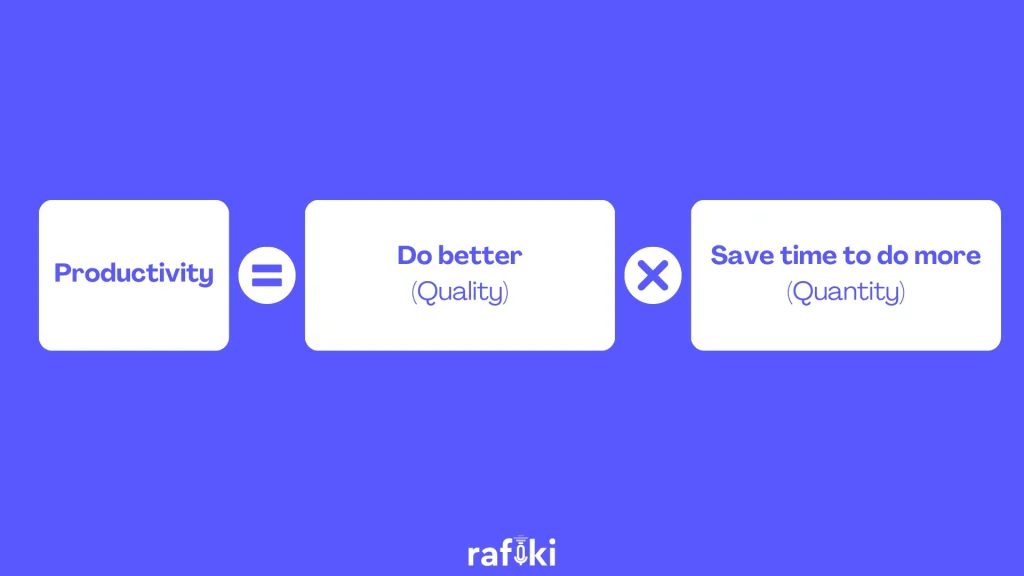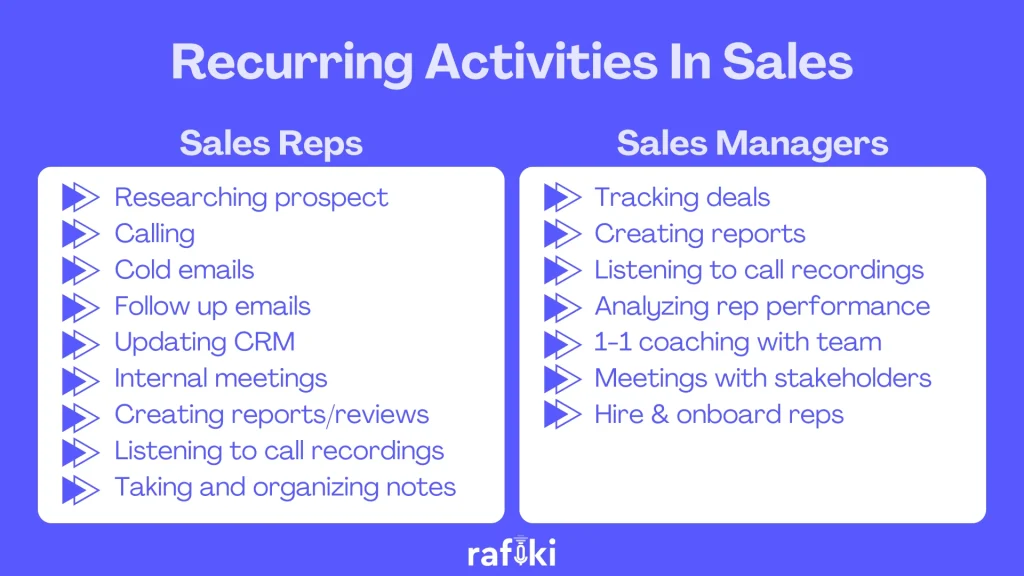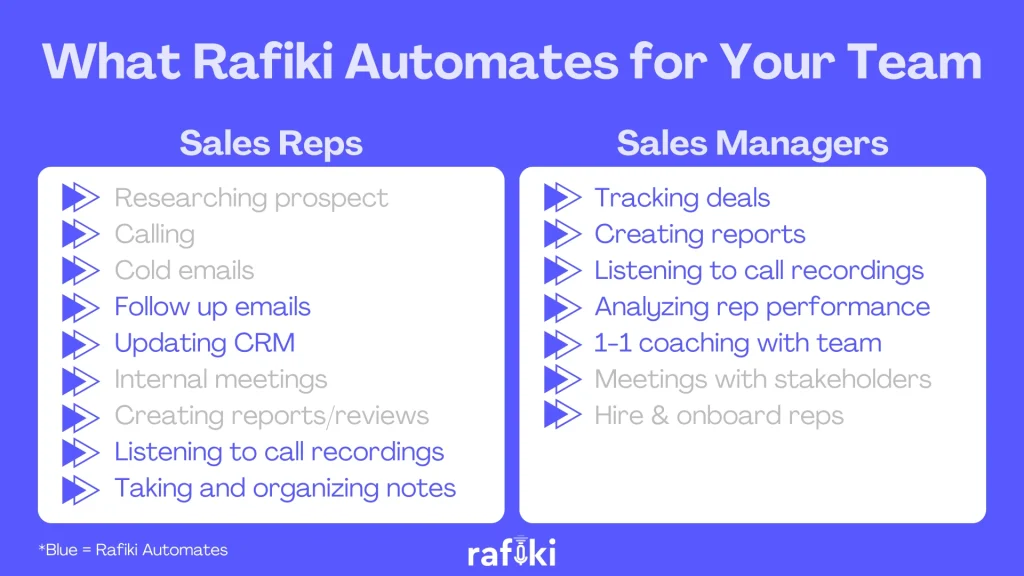Why Rafiki
Pricing


Pricing
Solutions

RevOps Leaders
Synchronize revenue generating functions

SDR Leaders
Get your team aligned and Coach your Reps 3x faster at scale

Sales Leaders
Unlock pipeline truth, drive confident forecasts

Sales productivity is undoubtedly one of the major concerns of every sales leader, and most, if not all, sales professionals.
All of us want to be in that peak productive state where we do everything we care about really well in the time we have. With low productivity, you waste time, resources, effort and money. With high productivity, you save them, perhaps even create more of some of them. And nobody really needs a massive survey with 100,000+ professionals participating to understand the impact low or high productivity could have on your goals.
And yet, productivity remains elusive. Often making us doubt if achieving it is illusive.
In this article, we’ll deconstruct sales productivity and learn exactly what is, how to impart a culture of productivity and equip your sales team to consistently remain at peak productivity.
Let’s get started.
Taking a holistic view, productivity is made up of two camps - saving time and doing things better.
Let’s say you’re making a sandwich. Normally, people would choose to either make a quick one and use the extra time to do other things, OR take their time to make a mean classic Italian sub or the perfect Bacon Egg & Cheese.
Now, ideally you want both. No, I don’t mean both Italian sub and BEC (although great idea for later). I mean what if you could make the perfect sandwich in no time? With that saved time, you could make more of those perfect sandwiches for your entire team.
Now, that’s productivity.

Let’s take a look at the two camps, in the sales context.
In order to understand how to save time for a sales team, we have to first go through what a normal day looks like for a rep or a manager. Let’s assume it’s remote sales, as travel time can vary too much to estimate for a field sales rep. So, on a given day, a remote rep and manager would be spending time on:

Now, for these recurring activities, there are 3 main ways to save time: Delegate, Eliminate & Automate
For certain recurring activities, there are parts of it that can be delegated. For example, a rep wanting to do research on a list of prospects can have the list enriched by a sales enablement or marketing team with specific information they’re looking for. This way, part of the activity can be delegated thereby saving time.
Although none of the recurring activities can be eliminated altogether, it is important to look at these activities from a strategic perspective. For example, if the need of the hour is to simply call more prospects, tasks like creating reports or certain internal meetings can be sacrificed to save time.
Elon Musk once described his 5 step process to dramatically improve nearly anything. In it, he makes a key observation that if you’re not adding and deleting parts of the process often, it means you’re not really trying to improve the process. What exactly gets deleted or added in your sales process depends on the context. But keep in mind that eliminating tasks that might seem important but really are not, is a powerful way to boost your team’s productivity.
Get your sales managers to come up with flow charts of what their sales processes look like and think “What can I delete? What can I add?”.
Automation is by far the most impactful way to save time. If you do it right, you’ll save time without compromising on the quality of work. Many of the recurring tasks can be automated to a large extent, especially with the advancement of AI. Here are the recurring activities that Rafiki can help automate for a rep:

HubSpot learned that a rep spends about 2 hours a day actually selling to prospects. With Rafiki, you could save hours of reps everyday. Using tools like Calendly to schedule calls and route prospects, or video tools like Vidyard to automate async communication can also be very helpful in saving time.
A sales team’s goal at improving themselves and their processes is never over. This is because products, prospects and markets change. Which is all the more reason to emphasize continuous improvement, especially from a productivity perspective.
To enable your team to do better, there are two main ways to help:
At the highest level, a sales team needs insights into what’s going on or going to happen with each deal and account. This means that not only do you have to keep track of everything down to the smallest details, your team should be able to connect the dots early enough to do something about risks.
With Rafiki, you get early warning signals when deals are not progressing well, when accounts are left untouched for too long or leads are going cold. Essentially, you get to save deals that would otherwise have fallen through the cracks.
Imagine a deal your team spent months on getting dropped because of avoidable mistakes. Your team’s productivity would fall negative in no time.
The ordinary way in which sales organizations improve their performance is by having the manager or sales coaches drag their feet through call recordings manually, take notes, analyze and come up with improvement plans. Ambitious sales reps would try this on their own too. And while this method does help in performance improvement, it’s counterproductive. Evaluating one rep manually itself takes so much time that it puts a dent in productivity. But doing it for dozens of reps? Too much.
Manual evaluation also gives diminishing results the more the managers/coaches do it, not to mention issues such as personal bias or preferences.
Thanks to our advanced AI, Rafiki can evaluate every single one of your reps’ calls, their performance across deals and accounts without using up any of your team’s time. And Rafiki, being a platform, has no bias or personal preference, so you can be assured that the evaluations are objective and accurate.
Now, sales reps don’t just call. So, how does Rafiki help the team on other activities?
This is where Rafiki’s Smart Follow Up comes in. By automatically crafting highly personalized follow ups to prospects, Rafiki ensures that all prospects are engaged. Each follow up would contain timestamped links to key moments in the call. Your team is not only alerted when a prospect clicks on a link, but a live chat is opened where your rep and prospect can engage in highly contextual communication.
Building a high-performing sales team hinges on fostering a culture of productivity. This goes beyond pushing for more calls or emails. It's about creating an environment where your reps feel motivated, supported, and equipped to achieve their best. Here are 6 key strategies to cultivate a productive sales culture:
You now have all the information you need to get started on improving your team’s productivity. But as with everything, actually attaining peak productivity is a whole different ball game.
Or it would have been, if not for Rafiki.
Explore Rafiki by signing up for a free 14 day trial and see how peak productivity can be achieved effortlessly.
Peak Sales Productivity: Easily Said & Done